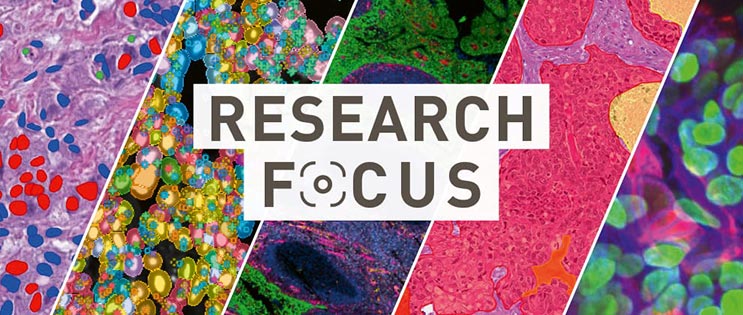Research focus: Three Other Breakthroughs to Watch
Over the last three months, we also learned that low-dose intestinal irradiation enhances the effectiveness of immunotherapy by acting on the microbiota and immune cells; that a subtype of sarcoma (DSRCT tumours) could be more effectively treated in the future by targeting a specific vulnerability in cancer cells; and that adjusting the dose and duration of immunotherapy in lung cancer could boost its efficacy while reducing side effects. Between January and March 2025, clinician-scientists at Gustave Roussy contributed to over 250 scientific publications.

2 January 2025 - Replication Stress Is an Actionable Genetic Vulnerability in Desmoplastic Small Round Cell Tumors. Published in Cancer Research.
This article focuses on desmoplastic small round cell tumours (DSRCT), a rare and aggressive type of sarcoma that primarily affects adolescent and young adult males. The prognosis for this disease remains poor, and there have been no significant therapeutic advances in the past 20 years.
DSRCT cancer cells experience replication stress – difficulty in copying their DNA – which makes them more reliant on DNA repair mechanisms to survive. In this study, led in part by members of the sarcoma laboratory at Gustave Roussy, 79 drugs were tested on DSRCT cells. Researchers identified a particular sensitivity of these cells to PARP inhibitors and ATR inhibitors, two targeted therapies that disrupt DNA repair pathways.
Results from both in vitro and in vivo preclinical models show that replication stress is an exploitable genetic vulnerability, opening up promising therapeutic avenues to improve the management of DSRCT.
Read the full article here: https://aacrjournals.org/cancerres/article/85/1/154/750632
21 January 2025 - De-Escalation Strategies with Immune Checkpoint Blockers in Non–Small Cell Lung Cancer: Do We Already Have Enough Evidence? Published in the Journal of Clinical Oncology.
This review article explores, in light of current evidence, the possibility of adjusting the dose, duration, or frequency of immunotherapy treatments in lung cancer without compromising efficacy.
With Dr Jordi Remon, thoracic oncologist at Gustave Roussy, as first author, the paper challenges the assumption that a one-size-fits-all standard is appropriate for immune checkpoint inhibitors. Pharmacogenetic studies suggest that lower doses may offer equivalent efficacy in lung cancer patients.
Moreover, extending the duration of treatment does not necessarily lead to better outcomes. It may even be feasible to discontinue immunotherapy after two years of administration. Ongoing clinical trials are currently investigating such de-escalation strategies in lung cancer.
Reducing the amount of drug administered could help limit side effects, improve patients’ quality of life, and reduce the financial burden on healthcare systems, all without lowering the chances of therapeutic success.
Read the full article here: https://ascopubs.org/doi/full/10.1200/JCO-24-02347
10 March 2025 - Low-dose irradiation of the gut improves the efficacy of PD-L1 blockade in metastatic cancer patients. Article published in Cancer Cell.
Radiotherapy is typically used to destroy tumours and eliminate cancer cells. However, it can also stimulate the immune system, particularly when combined with immunotherapy. Researchers at Gustave Roussy have discovered that low-dose irradiation of the gut enhances the effectiveness of immunotherapy in patients with metastatic cancer.
Altogether, eight retrospective studies and one phase II clinical trial demonstrated that low-dose gut irradiation boosts the overall immune response. A specific bacterium, Christensenellaceae, plays a key role in this effect. Researchers also found that gut irradiation promotes the migration of immune cells from the intestine to lymph nodes near the tumours, thereby stimulating anti-tumour immunity. In the phase II clinical trial, immunotherapy efficacy was even restored in some patients who had previously stopped responding to treatment.
This breakthrough reveals a novel interaction between radiotherapy, the microbiota, and immunotherapy. It paves the way for more personalised cancer treatments, where radiotherapy becomes a key tool to strengthen the immune system.
Read the full article here: https://www.cell.com/cancer-cell/fulltext/S1535-6108(25)00062-5
See also:
- 5 questions with Prof Alexandra Leary on pragmatic trials (News).
- Gustave Roussy Authorised to Conduct Phase I Clinical Trials in Nuclear Medicine (News).
- Gustave Roussy at the AACR 2025 Congress (News).
